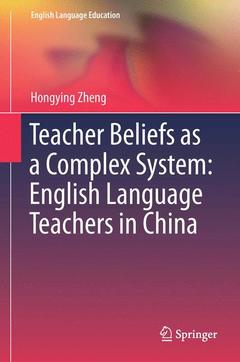Description
Teacher Beliefs as a Complex System: English Language Teachers in China, Softcover reprint of the original 1st ed. 2015
English Language Education Series, Vol. 4
Language: English
Subjects for Teacher Beliefs as a Complex System: English Language...:
Keywords
Chinese educational context; EFL in China; EFL teachers in Chinese secondary education; English as a foreign language in primary schools; English in Chinese highschools; complexity theory in education; curriculum reform; interpretivist ecological and sociocultural perspecitves; language classroom practice; national curriculum reform in China; pedagogical choices in language education; relationship between teachers' beliefs and practice; teacher beliefs; teacher cognition; teacher education in China; teachers'
Publication date: 10-2015
Support: Print on demand
Publication date: 08-2016
Support: Print on demand
Description
/li>Contents
/li>Comment
/li>
The volume is a practical introduction to the ways in which the teachers deal with classroom events in the context of change for researchers, teachers, administrators who wish to implement curriculum reform to EFL in schools. The author provides insights into the beliefs of Chinese teachers of English as a Foreign Language (EFL), and their pedagogical choices in the context of the National English Curriculum Reform. The complex nature of EFL teachers? beliefs about EFL teaching and learning are exposed, how their beliefs interact with mental and actionable processes triggered by classroom practice, and how their beliefs co-adapt with contexts to maintain the stability of the teachers? belief systems.
This is the first study to present complexity theory in a narrative context of education, exploring the non-linear and unpredictable features of the relationship between the teachers? beliefs and practices. Integrating complexity theory with interpretivist, ecological and sociocultural perspectives, this book contributes to the research agenda by providing a systematic framework for examining teacher beliefs as a whole, and examining the extent to which western theory may be applied to Chinese educational contexts.
Figures and Tables.- Preface.- Acknowledgments.- 1. Introduction.- 1.1 Aims and rationale.- 1.2 Methodological design.- 1.3 The significance.- 1.4 Overview of the study.- 2. Approaching Teachers’ beliefs from a perspective of complexity theory.- 2.1 Introduction.- 2.2 Definition of teacher beliefs.- 2.3 Introduction to language teacher beliefs.- 2.4 Complexity theory as a tool for understanding the relationship between beliefs, practice and contexts.- 2.5 Theoretical framework of the study.- 2.6 Analytical framework of the study.- 2.7 Conclusion.- 3. Chinese ELT context and EFL teachers.- 3.1 Introduction.- 3.2 Socio-economic contexts of Chinese educational reform.- 3.3 Chinese educational reform in the 21st century.- 3.4 Chinese EFL teachers’ dilemmas.- 3.5 Chinese EFL teachers’ professional development.- 3.6 Conclusion.- 4. Complex features of Chinese EFL teachers’ beliefs about EFL teaching.- 4.1 Introduction.- 4.2 Heterogeneity of the teachers’ professed beliefs about EFL teaching and learning.- 4.3 Interactive features of the teachers’ professed beliefs.- 4.4 Conclusion.- 5. Interactive dynamics between EFL teachers’ beliefs and practice.- 5.1 Introduction.- 5.2 Major types of the teachers’ practices and the teachers’ beliefs in practice.- 5.3 Analysis of the interactions between the teachers’ beliefs and practice.- 5. 4 Dynamic features of the teachers’ beliefs.- 5.5 Conclusion.- 6. Adaptive dynamics between EFL teachers’ beliefs and contexts.- 6.1 Introduction.- 6.2 Openness of the teachers’ belief systems.- 6.3 The mechanism of adaptation of the teachers’ complex belief system.- 6.4 Self-organisation of the teachers’ complex belief system.- 6.5 Conclusion.- 7. Complex features and co-adaptive mechanism of EFL teachers’ belief systems.- 7.1 Introduction.- 7.2 Heterogeneous belief systems.- 7.3 Interactive dynamic belief systems.- 7.4 Open and co-adaptive belief systems.- 7.5 Making sense of the teachers’ belief systems: dynamic stability and self-organisation.- 7.6 Conclusion.- 8. Conclusion.- 8.1 Introduction.- 8.2 Theoretical implications.- 8.3 Methodological implications.- 8.4 Pedagogical implications.- 8.5 Implications for further research
The first book to examine the extent to which western theory on teacher beliefs may be applied to Chinese educational contexts
Offers a practical introduction to the ways in which teachers implement curriculum reforms to EFL in their classrooms
The first work that applies complexity theory to the study of teacher cognition both as the theoretical and methodological framework.




